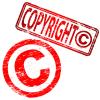Search Results

Public domain refers to the category for original creations which are not protected or bound to any owner by intellectual property laws. In this regard, a work can be defined as being in the public domain if it was not properly submitted for such protection within a sufficient period from its initial creation or presentation to the public, if the rights once accorded to it have..

BackgroundThe Berne Convention for the Protection of Literary and Artistic Works is an international treaty that refers to the concept and necessity of providing for an international copyright regulations and statutes. The Berne Convention was developed by Victor Hugo and was accepted and enacted into legislation in 1886 in Berne, Switzerland, which lends the convention its nam..

Legal Context for “Branding”As a common concept within the business and commercial worlds which has attracted increased attention as of the early 21st Century, branding refers to the practice through which the financial value or other goal aimed at through a particular activity, good, or service, or provider of any of those products, can be enhanced in pace with the expande..

Background
Internet piracy is considered the most important
issue facing the enforcement of copyright laws today. Media companies,
particularly those which specialize in films and music, have been strongly affected
by the ease in digital downloading which the Internet allows even for users
relatively lacking in technical expertise.
A common
such means for digital do..

According to the legislation set forth in the No Electronic Theft (NET) Act of 1997, now set forth in United States Code (U.S.C.) Title 18, copyright infringement can be punished in instances where the offense is committed “willfully and for purposes of commercial advantage or private financial gain.” Moreover, occurrences of copyright infringement can be treated, having be..

All copyright forms are public and can be made available upon request. Copyright records and indexes are available for free. Alternatively, a fee can be charged to cover the cost of production. Any records held by the copyright office are to be held and distributed based on the rules and regulations followed by the Copyright Office. These public copyright forms and indexes are ..

A copyright
is a form of protection that is placed on original works created to express
ideas. The idea being conveyed must be presented in a tangible medium. Mediums
which may be copyrighted are motion pictures, paintings, musical pieces,
websites, literary works, photographs, and more. The creator
of such works is automatically the original owner of the content..

Copyright registration exists for the sole purpose of protecting an individual or corporation from the possibility of infringement or violation of copyrights. Copyright registration, as allowed by provisions of copyright law, gives the opportunity to copyright owners to bring lawsuits of copyright infringement. The only way to legally be granted the opportunity is to have their..

The World
Trade Organization's overarching set of rules on intellectual property rights,
the TRIPS Agreement, contains language on copyright rules dictating which kinds
of original creative works may be accorded copyrights and the kinds of measures
that may be used under copyright law to prevent infringement. The copyrights
rules and other intellectual property protections..

Secondary transmission is not an infringement on copyright if the signal being transmitted is not from a cable system. The transmitting of signals must be made by hotel management, an apartment or similar establishment. The broadcast signals must be transmitted by a broadcast station licensed by the Federal Communications Commission. No direct charge can be made to view the sec..

Online Copyright Infringement Liability Limitation ActThe Online Copyright Infringement Liability Limitation Act is found under Title II of the Digital Millennium Copyright Act, which creates provisions that prevent online service providers and internet service providers a source of protection against copyright infringement liability. Such a movement became necessary becau..

A brief guide to time shifting
"Time shifting" is a legal term which initially referred to recording made of broadcasts such as television programs via VHS and Betamax tapes. However, in recent years more issues related to time shifting have emerged, including MP3 music files and the distribution of podcasts.
The major legal issue involved in ..

Registering a trademark can be considered to be a complex process. In order to register trademarks, one should be well aware of what a trademark is and the inherent legal issues and rights that are bestowed with a trademark.A trademark is a right given to protect a particular word, symbol or design. Examples can include the word "coke," and the shape of the Coca-Cola bottle. Th..

The TRIPS agreement was a type of international agreement that sought to establish rules and regulations regarding intellectual property. The agreement was created by the World Trade Organization. The TRIPS agreement is primarily concerned with copyrights and undisclosed information. It outlined the rights of music producers and performers and established laws regarding copyrig..

What is Web Scraping?
Web scraping is sometimes called data harvesting or site scraping and is a technique to retrieve data from a website or multiple websites. Scraping can occur by manually copying material from a website, but most scraping is conducted by complex software that can automatically access and retrieve data from websites.&nbs..
 Public domain refers to the category for original creations which are not protected or bound to any owner by intellectual property laws. In this regard, a work can be defined as being in the public domain if it was not properly submitted for such protection within a sufficient period from its initial creation or presentation to the public, if the rights once accorded to it have..
Public domain refers to the category for original creations which are not protected or bound to any owner by intellectual property laws. In this regard, a work can be defined as being in the public domain if it was not properly submitted for such protection within a sufficient period from its initial creation or presentation to the public, if the rights once accorded to it have.. BackgroundThe Berne Convention for the Protection of Literary and Artistic Works is an international treaty that refers to the concept and necessity of providing for an international copyright regulations and statutes. The Berne Convention was developed by Victor Hugo and was accepted and enacted into legislation in 1886 in Berne, Switzerland, which lends the convention its nam..
BackgroundThe Berne Convention for the Protection of Literary and Artistic Works is an international treaty that refers to the concept and necessity of providing for an international copyright regulations and statutes. The Berne Convention was developed by Victor Hugo and was accepted and enacted into legislation in 1886 in Berne, Switzerland, which lends the convention its nam.. Legal Context for “Branding”As a common concept within the business and commercial worlds which has attracted increased attention as of the early 21st Century, branding refers to the practice through which the financial value or other goal aimed at through a particular activity, good, or service, or provider of any of those products, can be enhanced in pace with the expande..
Legal Context for “Branding”As a common concept within the business and commercial worlds which has attracted increased attention as of the early 21st Century, branding refers to the practice through which the financial value or other goal aimed at through a particular activity, good, or service, or provider of any of those products, can be enhanced in pace with the expande.. Background
Internet piracy is considered the most important
issue facing the enforcement of copyright laws today. Media companies,
particularly those which specialize in films and music, have been strongly affected
by the ease in digital downloading which the Internet allows even for users
relatively lacking in technical expertise.
A common
such means for digital do..
Background
Internet piracy is considered the most important
issue facing the enforcement of copyright laws today. Media companies,
particularly those which specialize in films and music, have been strongly affected
by the ease in digital downloading which the Internet allows even for users
relatively lacking in technical expertise.
A common
such means for digital do.. According to the legislation set forth in the No Electronic Theft (NET) Act of 1997, now set forth in United States Code (U.S.C.) Title 18, copyright infringement can be punished in instances where the offense is committed “willfully and for purposes of commercial advantage or private financial gain.” Moreover, occurrences of copyright infringement can be treated, having be..
According to the legislation set forth in the No Electronic Theft (NET) Act of 1997, now set forth in United States Code (U.S.C.) Title 18, copyright infringement can be punished in instances where the offense is committed “willfully and for purposes of commercial advantage or private financial gain.” Moreover, occurrences of copyright infringement can be treated, having be.. All copyright forms are public and can be made available upon request. Copyright records and indexes are available for free. Alternatively, a fee can be charged to cover the cost of production. Any records held by the copyright office are to be held and distributed based on the rules and regulations followed by the Copyright Office. These public copyright forms and indexes are ..
All copyright forms are public and can be made available upon request. Copyright records and indexes are available for free. Alternatively, a fee can be charged to cover the cost of production. Any records held by the copyright office are to be held and distributed based on the rules and regulations followed by the Copyright Office. These public copyright forms and indexes are .. A copyright
is a form of protection that is placed on original works created to express
ideas. The idea being conveyed must be presented in a tangible medium. Mediums
which may be copyrighted are motion pictures, paintings, musical pieces,
websites, literary works, photographs, and more. The creator
of such works is automatically the original owner of the content..
A copyright
is a form of protection that is placed on original works created to express
ideas. The idea being conveyed must be presented in a tangible medium. Mediums
which may be copyrighted are motion pictures, paintings, musical pieces,
websites, literary works, photographs, and more. The creator
of such works is automatically the original owner of the content.. Copyright registration exists for the sole purpose of protecting an individual or corporation from the possibility of infringement or violation of copyrights. Copyright registration, as allowed by provisions of copyright law, gives the opportunity to copyright owners to bring lawsuits of copyright infringement. The only way to legally be granted the opportunity is to have their..
Copyright registration exists for the sole purpose of protecting an individual or corporation from the possibility of infringement or violation of copyrights. Copyright registration, as allowed by provisions of copyright law, gives the opportunity to copyright owners to bring lawsuits of copyright infringement. The only way to legally be granted the opportunity is to have their.. The World
Trade Organization's overarching set of rules on intellectual property rights,
the TRIPS Agreement, contains language on copyright rules dictating which kinds
of original creative works may be accorded copyrights and the kinds of measures
that may be used under copyright law to prevent infringement. The copyrights
rules and other intellectual property protections..
The World
Trade Organization's overarching set of rules on intellectual property rights,
the TRIPS Agreement, contains language on copyright rules dictating which kinds
of original creative works may be accorded copyrights and the kinds of measures
that may be used under copyright law to prevent infringement. The copyrights
rules and other intellectual property protections.. Secondary transmission is not an infringement on copyright if the signal being transmitted is not from a cable system. The transmitting of signals must be made by hotel management, an apartment or similar establishment. The broadcast signals must be transmitted by a broadcast station licensed by the Federal Communications Commission. No direct charge can be made to view the sec..
Secondary transmission is not an infringement on copyright if the signal being transmitted is not from a cable system. The transmitting of signals must be made by hotel management, an apartment or similar establishment. The broadcast signals must be transmitted by a broadcast station licensed by the Federal Communications Commission. No direct charge can be made to view the sec.. Online Copyright Infringement Liability Limitation ActThe Online Copyright Infringement Liability Limitation Act is found under Title II of the Digital Millennium Copyright Act, which creates provisions that prevent online service providers and internet service providers a source of protection against copyright infringement liability. Such a movement became necessary becau..
Online Copyright Infringement Liability Limitation ActThe Online Copyright Infringement Liability Limitation Act is found under Title II of the Digital Millennium Copyright Act, which creates provisions that prevent online service providers and internet service providers a source of protection against copyright infringement liability. Such a movement became necessary becau.. A brief guide to time shifting
"Time shifting" is a legal term which initially referred to recording made of broadcasts such as television programs via VHS and Betamax tapes. However, in recent years more issues related to time shifting have emerged, including MP3 music files and the distribution of podcasts.
The major legal issue involved in ..
A brief guide to time shifting
"Time shifting" is a legal term which initially referred to recording made of broadcasts such as television programs via VHS and Betamax tapes. However, in recent years more issues related to time shifting have emerged, including MP3 music files and the distribution of podcasts.
The major legal issue involved in .. Registering a trademark can be considered to be a complex process. In order to register trademarks, one should be well aware of what a trademark is and the inherent legal issues and rights that are bestowed with a trademark.A trademark is a right given to protect a particular word, symbol or design. Examples can include the word "coke," and the shape of the Coca-Cola bottle. Th..
Registering a trademark can be considered to be a complex process. In order to register trademarks, one should be well aware of what a trademark is and the inherent legal issues and rights that are bestowed with a trademark.A trademark is a right given to protect a particular word, symbol or design. Examples can include the word "coke," and the shape of the Coca-Cola bottle. Th.. The TRIPS agreement was a type of international agreement that sought to establish rules and regulations regarding intellectual property. The agreement was created by the World Trade Organization. The TRIPS agreement is primarily concerned with copyrights and undisclosed information. It outlined the rights of music producers and performers and established laws regarding copyrig..
The TRIPS agreement was a type of international agreement that sought to establish rules and regulations regarding intellectual property. The agreement was created by the World Trade Organization. The TRIPS agreement is primarily concerned with copyrights and undisclosed information. It outlined the rights of music producers and performers and established laws regarding copyrig.. What is Web Scraping?
Web scraping is sometimes called data harvesting or site scraping and is a technique to retrieve data from a website or multiple websites. Scraping can occur by manually copying material from a website, but most scraping is conducted by complex software that can automatically access and retrieve data from websites.&nbs..
What is Web Scraping?
Web scraping is sometimes called data harvesting or site scraping and is a technique to retrieve data from a website or multiple websites. Scraping can occur by manually copying material from a website, but most scraping is conducted by complex software that can automatically access and retrieve data from websites.&nbs..